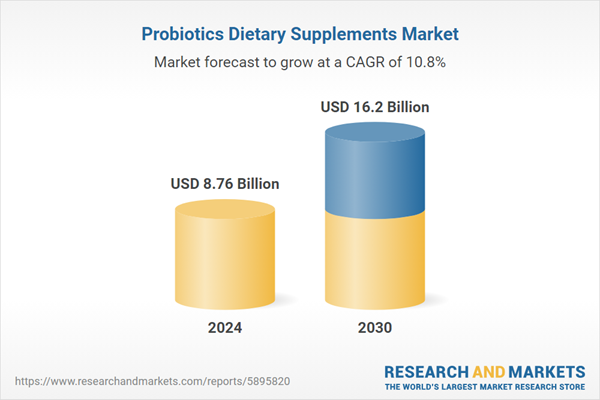Speak directly to the analyst to clarify any post sales queries you may have.
10% Free customizationThis report comes with 10% free customization, enabling you to add data that meets your specific business needs.
This growing adoption is closely tied to the increasing prevalence of lifestyle-related health conditions, including gastrointestinal disorders, weakened immune response, and chronic inflammation - particularly among adults and aging populations. Consumers are gravitating toward natural, non-pharmaceutical alternatives, fueling demand for probiotic products that align with clean-label principles and preventive wellness practices.
Key Market Drivers
Rising Prevalence of Gastrointestinal and Lifestyle-Related Disorders
The surge in gastrointestinal (GI) and lifestyle-related disorders is a key growth driver for the probiotics dietary supplements market. Non-communicable diseases (NCDs), which include many of these disorders, have become the dominant global health challenge, accounting for approximately 75% of all non-pandemic-related deaths. In 2021, NCDs were responsible for over 43 million deaths worldwide, with cardiovascular conditions leading the count.This shift has influenced both consumer behavior and healthcare priorities, positioning probiotics as an essential element of preventive and therapeutic strategies focused on gut health and overall well-being. Digestive issues such as irritable bowel syndrome (IBS), inflammatory bowel disease (IBD), acid reflux, constipation, and bloating are increasingly common across various age groups and geographies, further driving demand for probiotic supplementation.
Key Market Challenges
Quality Control and Product Standardization
Maintaining the quality, efficacy, and stability of probiotic supplements remains a significant challenge. As live microorganisms, probiotics must remain viable throughout the entire production, packaging, storage, and distribution cycle. Any degradation in potency can result in inconsistent health outcomes and potentially undermine consumer confidence. Ensuring stringent quality standards and formulation integrity is therefore critical for sustained market growth and credibility.Key Market Trends
Emergence of Personalized Nutrition
The growing demand for individualized health solutions is reshaping the probiotics landscape. Personalized nutrition - including custom probiotic formulations - is gaining momentum as consumers increasingly seek products tailored to their unique physiological needs. Innovations such as DNA testing and microbiome analysis are enabling the identification of specific probiotic strains that deliver targeted benefits based on individual health profiles, paving the way for highly personalized and effective wellness interventions.Key Market Players
- Vitakem Nutraceutical Inc
- Lesaffre International Corp
- DuPont de Nemours Inc
- H&H Group PLC
- Amway Corp
- Abbott Laboratories Inc
- Bayer AG
- Pfizer Inc.
- GSK PLC
- BASF SE
Report Scope:
In this report, the Global Probiotics Dietary Supplements Market has been segmented into the following categories, in addition to the industry trends which have also been detailed below:Probiotics Dietary Supplements Market, By Form:
- Chewables & Gummies
- Capsules
- Powders
- Tablets & Softgels
- Others
Probiotics Dietary Supplements Market, By End-Use:
- Infants
- Children
- Adults
- Geriatric
Probiotics Dietary Supplements Market, By Application:
- Sports Fitness
- Energy & Weight Management
- General Health
- Bone & Joint Health
- Gastrointestinal Health
- Immunity
- Cardiac Health
- Diabetes
- Anti-cancer
- Skin/Hair/Nails
- Brain/Mental Health
- Others
Probiotics Dietary Supplements Market, By Region:
- North America
- United States
- Canada
- Mexico
- Europe
- France
- United Kingdom
- Italy
- Germany
- Spain
- Asia-Pacific
- China
- India
- Japan
- Australia
- South Korea
- South America
- Brazil
- Argentina
- Colombia
- Middle East & Africa
- South Africa
- Saudi Arabia
- UAE
- Kuwait
Competitive Landscape
Company Profiles: Detailed analysis of the major companies present in the Global Probiotics Dietary Supplements Market.Available Customizations:
With the given market data, the publisher offers customizations according to a company's specific needs. The following customization options are available for the report.Company Information
- Detailed analysis and profiling of additional market players (up to five).
This product will be delivered within 1-3 business days.
Table of Contents
Companies Mentioned
- Vitakem Nutraceutical Inc
- Lesaffre International Corp
- DuPont de Nemours Inc
- H&H Group PLC
- Amway Corp
- Abbott Laboratories Inc
- Bayer AG
- Pfizer Inc.
- GSK PLC
- BASF SE
Table Information
| Report Attribute | Details |
|---|---|
| No. of Pages | 180 |
| Published | April 2025 |
| Forecast Period | 2024 - 2030 |
| Estimated Market Value ( USD | $ 8.76 Billion |
| Forecasted Market Value ( USD | $ 16.2 Billion |
| Compound Annual Growth Rate | 10.7% |
| Regions Covered | Global |
| No. of Companies Mentioned | 10 |









